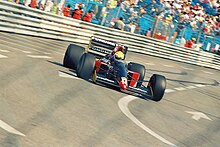Fondmetal
In Palosco they made induction manifolds, water conduits, clutch bellhousing, oil pumps, cylinder heads and engine blocks for clients such as Maserati Biturbo, Fiat, Iveco, OM and Magneti Marelli.
From there the Fondmetal brand grew, and was established as a leader in forged and cost wheel design, engineering and manufacturing in Italy.
[3] In the mid-1980s, the company supplied wheels to Williams, Tyrrell and Ligier, while continuing to sponsor Ghinzani and, later, the Osella team.
He initially persevered with Osella's driver, Olivier Grouillard, until he tired of the Frenchman's reckless side and attitude problem, replacing him with Gabriele Tarquini.
The new team was no more successful than in the Osella days, sometimes the results being even worse than those of its fellow back row contenders Coloni or AGS.
The Bicester-based design office was headed by Tino Belli and founded by Rumi who thought that British input was necessary for gaining success.
With the new car, Grouillard managed to be faster than the Coloni machine, but that does not mean that Fondmetal was able to pass pre-qualifying regularly.
Only a handful of race participations were possible, but results were poor, although Grouillard did qualify 10th for the 1991 Mexican Grand Prix, ahead of Andrea de Cesaris in the Jordan, who eventually finished 4th.
The car received a Ford HB V8 engine (from the previous year's Benetton) to replace the Lamborghini V12 or the Judd V10 that Rumi had preferred.
While van de Poele proved competitive, he spun off on the third lap in Hungary, losing the Italian team's last good chance of a points finish.
Only two races later after the Italian Grand Prix in September 1992, the team withdrew from the championship for financial reasons, having scored a pair of 10th places, although Tarquini managed to qualify for all thirteen races in which the team participated in 1992 and Chiesa (in ten attempts) and van de Poele (in only three) qualified three times each.
Rumi contemplated racing Giuseppe Bugatti as a pay-driver in order to get through the 1992 Portuguese Grand Prix, but decided instead to close his team.
Rumi would return to Formula One in a more modest capacity in 1994, with Fondmetal as a technical partner and sponsor of Tyrrell, and for 1996 Minardi.
Rumi would gradually increase his interest in the Faenza outfit, becoming co-owner and chairman, even going as far as rebadging the Ford Zetec-R engines in 2000.

